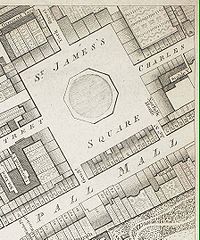Norfolk House
51°30′26″N 0°8′2″W / 51.50722°N 0.13389°W





Norfolk House, at 31 St James's Square, London, was built in 1722 for the Duke of Norfolk. It was a royal residence for a short time only, when Frederick, Prince of Wales, father of King George III, lived there 1737-1741, after his marriage in 1736 to Princess Augusta of Saxe-Gotha, daughter of Frederick II, Duke of Saxe-Gotha. King George III was born in the house, which was offered to the royal couple by the 9th Duke of Norfolk.
The family moved to Leicester House in 1742, and it was to remain the prince’s home until his death nine years later, and that of his widow until her death in 1764.
The original Norfolk House remained in the ownership of the Dukes of Norfolk until 1938 when it was pulled down, and the site became an office building. During the Second World War this building served as offices for senior officers from a variety of Allied armed forces, including the Canadian 1st Army and the Supreme Headquarters Allied Expeditionary Force under General Dwight D. Eisenhower. Two plaques on the exterior of the building acknowledge the role of the building in the War. Today the 1930s building on the site is occupied by offices, the interior having been fully refitted in recent years.
Parts of the interior of the eighteenth-century house survive, having been removed before demolition, including the Music Room, designed by Giovanni Battista Borra for the ninth Duke's wife Mary. Having been in storage, the room is now displayed in the Victoria and Albert Museum, restored and redecorated to its original scheme of brilliant white paintwork with gilt, carved woodwork.
See also
External links
- Detailed history and description - from the Survey of London.
- Photograph of 1932 - from the Survey of London.
- "Norfolk House Music Room". Furniture. Victoria and Albert Museum. Retrieved 2008-07-01.
